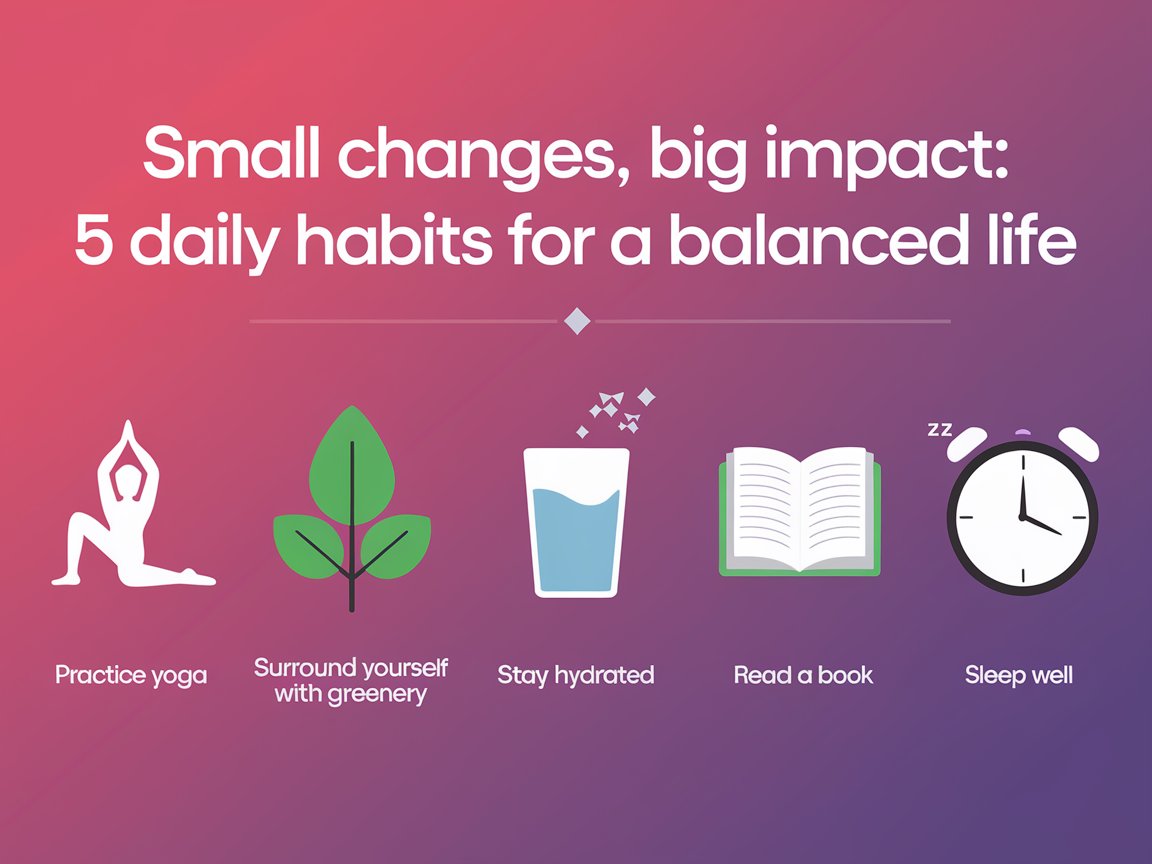Small Changes, Big Impact: 5 Daily Habits for a Balanced Life
In today’s fast-paced world, achieving a healthy work-life balance can often feel like an elusive goal. Many people find themselves juggling demanding jobs, personal commitments, and the need for downtime, leading to stress and burnout. However, the good news is that small changes can lead to significant improvements in your overall well-being. By adopting a few simple daily habits, you can cultivate a more balanced life. This article will explore five effective habits that can help you enhance your work-life balance.
1. Prioritize Your Morning Routine
The way you start your day can set the tone for everything that follows. A structured morning routine is crucial in establishing a positive mindset and preparing you for the challenges ahead. Prioritizing your morning means intentionally choosing how you spend those first precious hours.
Consider incorporating practices such as meditation, light exercise, or a nutritious breakfast into your morning. Meditation, even for just five minutes, can help clear your mind and enhance focus. Exercise—whether a quick workout or a leisurely walk—boosts your energy levels and improves your mood. A balanced breakfast provides essential nutrients to fuel your body and mind throughout the day.
The benefits of a well-planned morning routine are substantial. Research shows that individuals who follow a structured morning ritual experience increased productivity and reduced stress. By prioritizing your morning, you create a solid foundation that allows you to tackle your tasks with clarity and confidence.
2. Set Clear Boundaries
In an era where work and personal life often blend seamlessly, setting clear boundaries is essential for maintaining balance. Without defined limits, it becomes easy to allow work to spill over into personal time, leading to stress and feelings of overwhelm.
Start by establishing designated work hours. Communicate these hours to your colleagues and loved ones to help manage expectations. Consider implementing a “do not disturb” period, especially during times when you need to focus on personal activities or relaxation.
One practical approach is to create a separate workspace, even if it’s a small corner of your home. This physical separation can mentally help you transition between work and personal life. Setting boundaries not only reduces stress but also enhances your ability to focus during work hours, allowing you to be more present in your personal life.
3. Incorporate Breaks into Your Day
While it may seem counterintuitive, taking regular breaks can significantly enhance your productivity and mental well-being. Many people fall into the trap of pushing through long stretches of work, believing it will lead to greater efficiency. However, prolonged periods of focus can lead to fatigue and burnout.
Incorporate short breaks into your daily routine to recharge. Simple activities like taking a five-minute walk, practicing deep breathing, or stepping away from your screen can make a big difference. Research has shown that regular breaks can improve concentration and creativity, leading to better problem-solving and decision-making.
Consider using techniques such as the Pomodoro Technique, which involves working for 25 minutes followed by a five-minute break. After four cycles, take a longer break of 15-30 minutes. This method not only enhances focus but also prevents the mental fatigue that often accompanies long work sessions. Remember, rejuvenating your mind is essential for maintaining high levels of productivity.
4. Practice Gratitude Daily
Practicing gratitude is a powerful tool for enhancing your mental well-being and promoting a balanced life. When you take the time to acknowledge and appreciate the positive aspects of your life, you shift your focus away from stressors and challenges.
Start by dedicating a few minutes each day to reflect on what you are grateful for. This could be as simple as writing down three things you appreciate about your day or sharing your gratitude with a friend or family member. Journaling is a particularly effective method; not only does it help solidify your feelings of gratitude, but it also allows you to revisit those positive thoughts during challenging times.
The benefits of practicing gratitude are well-documented. Studies show that expressing gratitude can lead to increased happiness, reduced stress, and improved relationships. By fostering a grateful mindset, you create a positive feedback loop that enhances your overall outlook on life, making it easier to handle stressors as they arise.
5. Make Time for Self-Care
In the pursuit of work-life balance, self-care often takes a backseat. However, prioritizing self-care is essential for your overall well-being and resilience. Self-care encompasses any activity that nourishes your mental, emotional, and physical health.
Start by identifying activities that bring you joy and relaxation. This could be engaging in a favorite hobby, spending time with loved ones, or simply taking a quiet moment for yourself. Make a conscious effort to carve out time for these activities in your daily schedule.
Consider incorporating self-care rituals into your routine. This might include a relaxing bath, reading a book, or practicing yoga. The key is to find activities that recharge you and bring you happiness. By prioritizing self-care, you enhance your energy levels, reduce stress, and improve your ability to cope with life’s demands.
Conclusion
In conclusion, achieving a healthy work-life balance doesn’t require drastic changes or monumental shifts. By implementing these five daily habits—prioritizing your morning routine, setting clear boundaries, incorporating breaks, practicing gratitude, and making time for self-care—you can create a more balanced and fulfilling life.
Start by focusing on one habit at a time and gradually integrate them into your daily routine. Remember, small changes can lead to significant impacts, and cultivating balance is a continuous journey. By prioritizing your well-being and making conscious choices, you can enjoy a more harmonious life.



